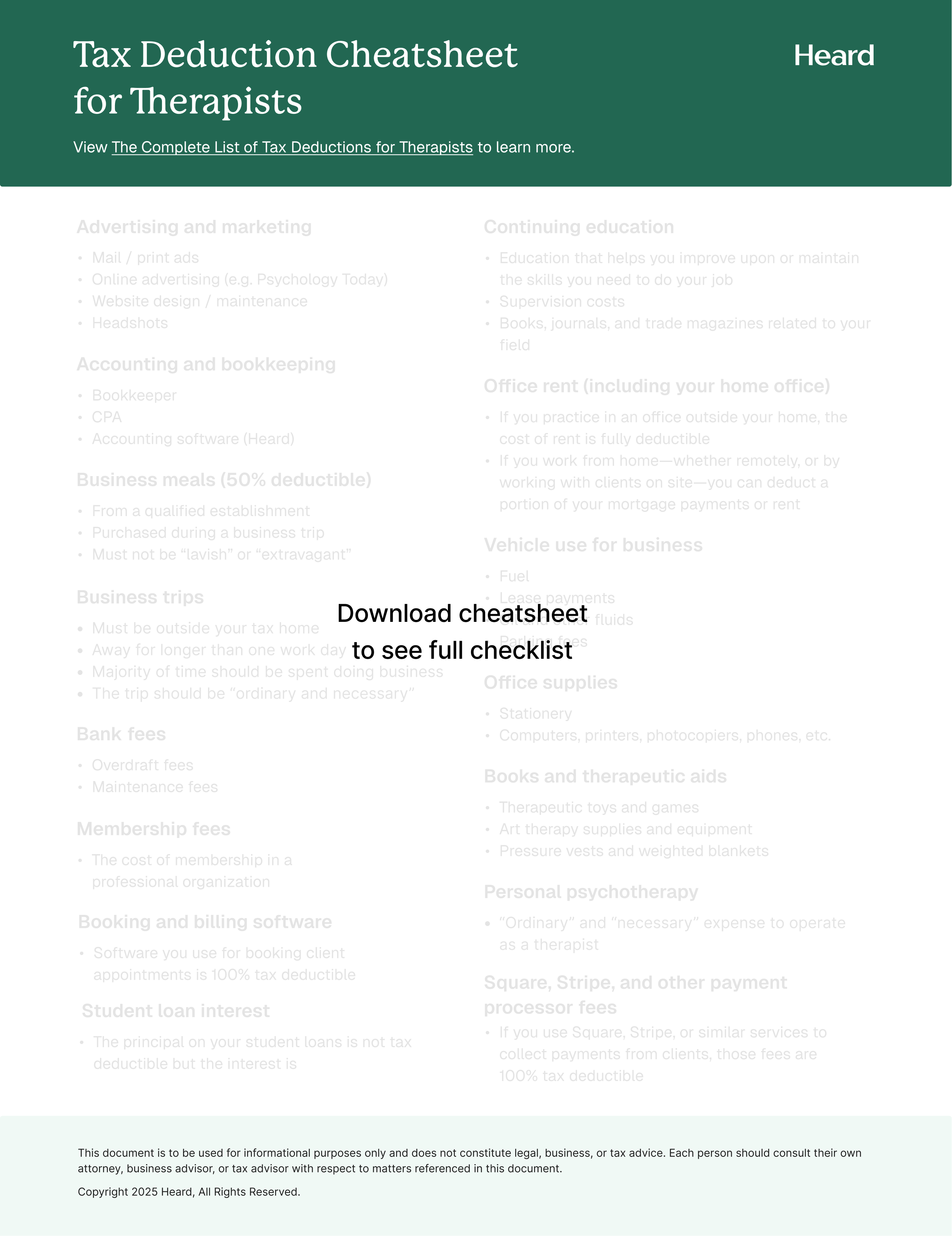By taking advantage of business travel deductions, self-employed therapists can lower their tax bill—helping to offset the cost of the trip.
The business travel deduction not only includes the cost of travel itself—vehicle mileage or air fare, for instance—but may also include costs you incur along the way, including meals on the road, accommodations, and even dry cleaning.
Here are some of the business travel deductions you can claim when you run your own therapy practice, and how to report them on your tax return.
Heads up: Before claiming any deductions on your tax return, make sure to run them by a qualified accountant or tax advisor.
{{resource}}
Can I deduct the cost of commuting to my therapy practice?
One of the most common questions newly self-employed therapists ask is whether they can claim the cost of commuting to their therapy practices.
The answer? No.
Travel you undertake as part of the regular commute to your office is not tax deductible. Business travel deductions only apply to travel outside the area defined as your tax home. More on that below.
What counts as tax-deductible business travel for therapists?
So long as you’re traveling outside your tax home for business, most (if not all) of your travel expenses are tax deductible.
In the words of the IRS, “Your tax home is the entire city or general area where your main place of business or work is located, regardless of where you maintain your family home.”
Suppose the drive from your home to your therapy practice takes an hour and a half on the freeway. In fact, your office is located in a different county. Nonetheless, you can’t deduct the cost of commuting there. You aren’t traveling outside your tax home—the location of your business—in order to work.
On the other hand, you might take a shorter trip to a different location in order to meet with a business associate. In that case, there’s a good chance the trip will be tax deductible, since you aren’t traveling to your tax home but you are traveling for business.
A few more important rules apply when determining if a business trip is tax deductible:
- Your trip cannot be indefinite. Any travel you undertake for work must have a clearly defined end date.
- The trip must last less than a year. In the eyes of the IRS, any business trip lasting more than a year is indefinite.
- The majority of your days away must be dedicated to business. You don’t have to work every day you’re away on business, but the majority of the days you’re away must be work days. If you are traveling outside of the USA, only 25% of the days you’re away must be dedicated to business for it to count as a business trip.
- You must work regular full time hours on your work days. You can’t write off a two week trip to Mali by spending half an hour each day answering work emails. In order for your trip to qualify as a business expense, you should be logging regular work days (ie. about eight hours of business-related activities each day you work).
For a more detailed rundown, see the IRS article on business travel expenses.
Common business travel expenses for therapists
You may find it surprising how many expenses you can deduct when you’re on the road for business. That being said, be sure to check with an accountant before claiming any expenses on your tax return.
Personal vehicle use
If you use your own vehicle to travel for work, you can deduct the cost of making the trip. You have two options for doing so: The standard mileage rate and the actual expenses deduction.
The standard mileage rate is a monetary value per mile travelled that you can claim for work trips. It’s the simplest and most straightforward way to deduct mileage for business trips.
The actual expenses deduction calculates the total amount you spend on your vehicle over the course of the year, then calculates the miles you travelled for work as a percentage of that total and deducts it.
How to claim personal vehicle use with the standard mileage deduction
Typically, the standard mileage deduction changes from one year to the next—see the IRS list of mileage rates.
Note: In 2025, the standard mileage rate is $.70/mile.
Here’s how to calculate your deduction:
- Add up all the miles travelled for work during the tax year you’re filing for. Example: In 2021, you travelled 1,200 miles for business.
- Find the relevant mileage rate for the year you’re filing. Example: The mileage rate in 2025 was $0.70.
- Multiply the total miles travelled by the mileage rate for the year. Example: 1,200 multiplied by $0.70 is $840.
- Deduct the total on your tax return.
How to claim personal vehicle use with the total expense deduction
As an alternative to the mileage rate deduction, you can deduct vehicle costs on your tax return using the total expense deduction.
Heads up: If you use the actual expense deduction to write off travel costs for its first year of business use, you are required to keep using the total expense deduction every year after. You cannot switch from the total expense deduction to the standard mileage rate deduction.
Another heads up: If you lease your vehicle and its value is above a certain amount, the amount you’re able to deduct using this method is reduced. Consult with an accountant if you plan to claim a total expense deduction on a leased vehicle.
Here’s how to calculate the deduction:
- Add up all your vehicle expenses for the year. That includes the cost of:
- Fuel
- Insurance
- Vehicle loan interest
- Vehicle depreciation
- Parking fees
- Garage rental
- Tolls
- Lease payments
- Oil changes
- Maintenance
- Repairs
- Tires
- License and registration fees
Example: Suppose that, adding up all these expenses, the total cost of using your vehicle last year was $5,000.
- Calculate the percentage of vehicle use for the year that was devoted to business.
Example: You drove 14,000 miles last year, and 700 of those miles were business travel, so you can deduct 5% of your total vehicle expenses.
- Multiple the percentage of miles travelled for business by your total vehicle expense.
Example: 5% of $5,000 is $250, so you can deduct $250 in mileage expenses on your tax return.
Lodging
The cost of renting a hotel room, AirBnB, or other accommodations while you’re away is tax deductible.
You can deduct the cost of lodging even on days you aren’t working, so long as:
- Your days off are scheduled in between days when you’re working. For example, you’re working Friday, Monday, and Tuesday, but not Saturday and Sunday.
- You spend the majority of your days away either travelling or doing work. For example, you’re working three days (Friday, Monday, and Tuesday) and resting two (Saturday and Sunday).
In the above example, it wouldn’t make sense for you to travel home on the weekend only to return to work the next week, so it’s valid to claim your weekend lodging as a deductible expense.
Taxis and rideshare services (Uber, Lyft)
You can deduct any fees or fare you pay for extra transportation while you’re travelling for business, but the extra travel needs to relate to your work as a therapist.
For instance, the cost of a taxi to the airport so you can catch your flight for a business trip is tax deductible. The cost of a taxi so you can go sightseeing on your days off is not.
Airfare
The cost of flying to your destination is 100% tax deductible, so long as the trip meets the criteria to qualify as a business trip (e.g. you’re spending the majority of your days away working).
Baggage and shipping
If you need to pay extra to bring business-related baggage with you on a flight, or if you need to have something shipped to you while you’re away, the cost is tax deductible.
Meals and entertainment
Even when you’re on the road, the cost of meals and entertainment is only 50% tax deductible.
You can apply this deduction to in two instances:
- While you travel. If you’re in transit to your destination, the cost of any meals along the way is 50% deductible.
- For business meals and entertainment. So long as you’re meeting with other people for business purposes, you can deduct 50% of the bill. As with any meal or entertainment expenses you’d claim at home, keep notes on who you met with and what you discussed.
The cost of meals and entertainment while you’re neither working nor traveling to your destination is not tax deductible.
Miscellaneous travel expenses
Any expense you incur while traveling or staying at your destination is tax deductible so long as you can prove it was necessary in the course of doing business.
Examples include:
- Dry cleaning for business clothing
- Equipment rental, eg. for giving a presentation
- Wi-fi access so you can work while you travel
{{resource}}
Business travel expenses you can’t deduct
There are two non-deductible expenses you should watch out for when traveling:
- The cost of bringing spouses or children. While you’re allowed to bring family members with you while traveling for business, the related costs—extra airfare, lodging, and meals on the road, for instance—are not tax deductible.
- Non-essential lodging fees. The cost of extra perks when you stay at a hotel—Pay-Per-View movies, gym access, trips to the sauna—are not tax deductible.
Deducting the cost of travel to conferences
Travel to conferences is tax deductible so long as you can prove the conference is related to your work as a therapist. You don’t need to be presenting at a conference or participating in any panels to deduct the cost, but the conference should benefit your business in some way—for instance, by contributing to your continuing education, or providing opportunities for networking with other mental health professionals.
Recordkeeping for business travel deductions
In order to deduct the cost of business travel from your taxes, you should be able to prove you incurred the expenses you’re reporting. Save receipts for all the expenses you’re claiming, and keep them organized. In the event of an audit, the IRS may go back six years into your tax return history for proof of the expenses you’ve reported.
Reporting business travel deductions on your tax return
If your therapy practice is a pass-through entity, you report your business expenses on Schedule C of Form 1040.
Pass-through entities include:
- Sole proprietorships
- S corporations
- Partnerships
- LLCs filing as any of the above
If your therapy practice is a C corporation, you report your business expenses when filing Form 1120. Learn more about business entities for therapy practices.
What happens if the IRS challenges your deductions?
There are two major reasons the IRS may challenge your business travel deductions and proceed to charge you a penalty:
- Some of your deductions were not legitimate business expenses
- You don’t have supporting documentation for your expenses (ie. receipts)
If you’re penalized, you’ll be required to pay 120% of the difference between the income you reported after including illegitimate deductions and the amount the IRS determines is legitimate. For more information, see How to Determine if Something is a Tax Deduction for Therapists.
Form 8275
You have the option of filing Form 8275 with your tax return. This form discloses extra information about the expenses you’re claiming that doesn’t fit on your Schedule C. By providing tax authorities with more information about your claims, you may be able to reduce the likelihood the IRS challenges them.
Also, in the event your claims are found to be illegitimate, Form 8275 allows you to avoid the 20% penalty—so you only pay 100% of the difference between the income you reported after including illegitimate deductions and the amount the IRS determines is legitimate. Filing Form 8275, however, does not reduce your likelihood of being audited.
—
As always, in order to avoid penalties, the best approach when claiming expenses on your tax return is to get confirmation from a tax professional before filing.
What other expenses can therapists claim on their tax return? To find out, see our Complete List of Tax Deductions for Therapists.
This post is to be used for informational purposes only and does not constitute legal, business, or tax advice. Each person should consult their own attorney, business advisor, or tax advisor with respect to matters referenced in this post.
Bryce Warnes is a West Coast writer specializing in small business finances.
{{cta}}
Manage your bookkeeping, taxes, and payroll—all in one place.

Discover more. Get our newsletter.
Get free articles, guides, and tools developed by our experts to help you understand and manage your private practice finances.





